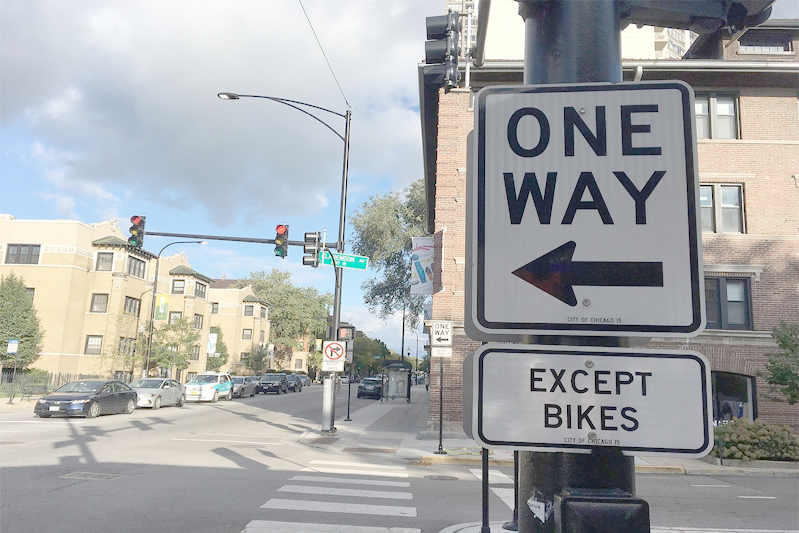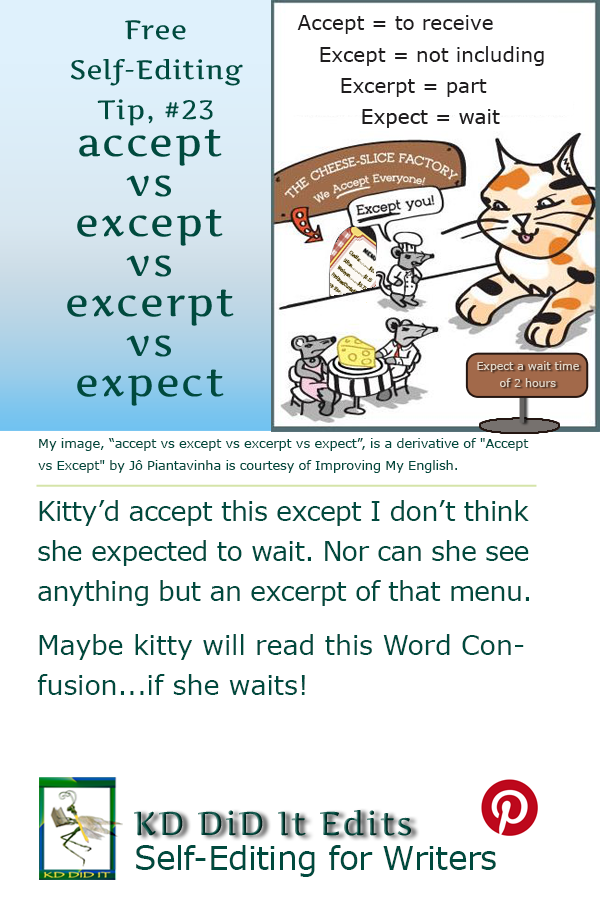The most common word confusion is that between accept and except.
And it is easy enough to mistype except and expect. God knows, I had to keep checking this post to make sure I had the proper juxtaposition of letters throughout! Hmm, maybe I should check again . . .
Tricks to Distinguish Between Accept, Except, Excerpt, & Expect
There’s something about the acc- in accept that feels comfortable, accepting which goes toward its definition of receiving something. The ex- in except has a negative feel . . .I always think ex-spouse. Someone I’d want to exclude from memory, lol.
As for excerpt, it’s the rpt. For some reason my mind jumbles that around to part, and since excerpt is only a part of something . . . well, it’s a no-brainer.
As for expect . . . it has a waiting-ish feel to it. I feel as though I’m hovering, waiting for the rest of the word to arrive.
I accept the terms of your offer, but I wish to except the clause calling for repayment of the deposit.
Word Confusions . . .
. . . started as my way of dealing with a professional frustration with properly spelled words that were out of context in manuscripts I was editing as well as books I was reviewing. It evolved into a sharing of information with y’all. I’m hoping you’ll share with us words that have been a bête noire for you from either end.
If you found this post on “Accept vs Except vs Excerpt vs Expect” interesting, consider subscribing to KD Did It, if you’d like to track this post for future updates.
| Accept | Except | Excerpt | Expect |
|---|---|---|---|
 — |
 |
 — |
 — |
| Part of Grammar: | |||
| Verb, intransitive & transitive
Third person present verb: accepts |
Conjunction 1; Preposition 2; Verb, transitive 3 Third person present verb: excepts |
Noun 1; Verb, transitive 2 Noun plural: excerpts Third person present verb: excerpts |
Verb, intransitive & transitive
Third person present verb: expects |
| Take what’s offered
Verb, intransitive: Consent to receive a thing offered
Verb, transitive:
Believe or come to recognize an opinion, explanation, etc., as valid or correct
|
Exclude
Conjunction: Used before a statement that forms an exception to one just made 1
Preposition: Other than Verb, transitive: |
Part
Noun: A short extract from a film, broadcast, or piece of music or writing 1 Verb, transitive:
|
Wait
Verb, intransitive: [Archaic] Wait Stay To look forward To be pregnant
Verb, transitive:
[Archaic] Await Anticipate or look forward to the coming or occurrence of |
| Examples: | |||
| Verb, intransitive: Tim offered Brian a lift home and he accepted. Verb, transitive: He would accept their offer and see what happened. Ronald is a good match and she ought to accept him. The college accepted her as a student. Credit cards are widely accepted. The Harvard literati never accepted him as one of them. Vending machines that accepted 100-yen coins for cans of beer are few and far between. This tentative explanation came to be accepted by the group. It is accepted that aging is a continuous process. Jenkins is willing to accept his responsibility. He accepts that he made a mistake. They accepted the need to cut expenses. |
Conjunction: I didn’t tell him anything, except that I needed the money. Our berets were the same except mine had a leather band inside. She never offered advice, except it were asked of her. You will languish in Hell except you repent. The town of Hilarity was inaccessible except by boat. I would go except that you’ll be gone longer than I can be away. Preposition: They work every day except Sunday. We get the paper daily except Sundays. The stores are open daily except the major holidays. Verb, transitive: |
Noun: Triskell put together an excerpt of the story. This is an excerpt of the whole. Just read the excerpt. It’ll give you an idea of what it’s about. Verb, transitive: |
Verb, intransitive: She’s expecting next month. Verb, transitive: He expects the stock market to sink further. He expect that farmers will harvest 63 million acres of hay. They were not expecting him to continue. Celia was expecting a visitor. We expect great things of you. We expect employers to pay a reasonable salary. They’re just friends of his, I expect. I expect you know them? Mary is expecting a baby. It’s only to be expected. You know her mama . . . What can you expect? We were expecting them any minute now. I had expected the cab to be here by now. |
| Derivatives: | |||
| Adjective: accepted Adverb: acceptedly Noun: acceptation, accepter, accepting Verb: preaccept Verb, transitive: reaccept |
Adverb: unexceptionably Adjective: exceptionable, exceptional, unexceptionable, unexceptional Noun: exception, exceptionality, unexceptionableness |
Adjective: excerptible Noun: excerption, excerpter, excerptor |
Adjective: expectable, unexpected Adverb: expectably, expectedly, unexpectedly Noun: expectedness, expecting, unexpectedness |
| History of the Word: | |||
| The first known use was in the 14th century.
Late Middle English from the Latin acceptare, an iterative of accipere meaning take something to oneself, from ad- (to) + capere (take). |
|
|
The first known use was in 1560 and based on the sense defer action or wait from the Latin exspectare meaning look out for, from ex- (out) + spectare (to look) (iterative of specere meaning see). |
C’mon, get it out of your system, bitch, whine, moan . . . which words are your pet peeves? Also, please note that I try to be as accurate as I can, but mistakes happen or I miss something. Email me if you find errors, so I can fix them . . . and we’ll all benefit!
Satisfy your curiosity about other Word Confusions on its homepage or more generally explore the index of self-editing posts. You may also want to explore Book Layout & Formatting Ideas, Formatting Tips, Grammar Explanations, Linguistics, Publishing Tips, the Properly Punctuated, Writing Ideas and Resources, and Working Your Website.
Resources for Accept vs Except vs Excerpt vs Expect
Some of these links may be affiliate links, and I will earn a small percentage, if you should buy it. It does not affect the price you pay.
Apple Dictionary.com
Merriam-Webster: expect
Pinterest Photo Credits
Accept vs Except by Jô Piantavinha is courtesy of Improving My English.
Revised as of 16 Oct 2022
By: Kathy Davie


